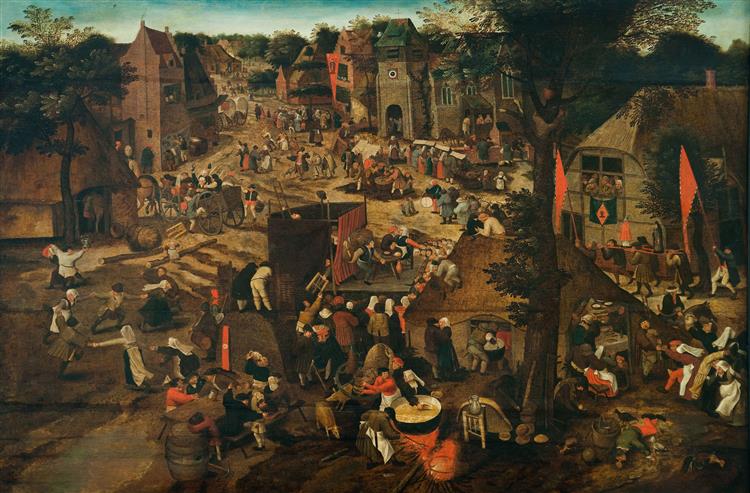Beskrivelse
Pieter Brueghel the Younger's A Village Fair (Village Festival in Honour of Saints Hubert and Anthony) is a splendid example of the distinctive style of 17th-century Flemish art, rich in detail and vibrant depictions of rural life. Brueghel the Younger, son of the celebrated Pieter Brueghel the Elder, devoted much of his career to replicating and reinterpreting his father's themes, becoming a master of the populated landscape that captures the essence of the festivities and everyday activities of his time.
The composition of the painting displays a large festive scene centered on a community event in a rural setting. The work is rich in detail, with each figure playing an important role in the visual narrative. Throughout the painting, one can observe a variety of characters—from groups of peasants animatedly interacting to individuals engaged in games and celebrations. This social fabric suggests a sense of community and joy, a testament to the daily life and culture of the time.
The colours used are predominantly warm and earthy tones, evoking the closeness of nature and the welcoming atmosphere of the festival. The colour palette, which includes ochres, deep greens and soft blues, not only provides a harmonious frame to the scene, but also creates a sense of depth and naturalness. Shadows and sunlight are masterfully distributed, highlighting both the faces of the participants and the various elements of the landscape, such as the traditional market that seems to be bustling with life.
Among the fascinating details is the depiction of typical customs and clothing of the period. The faces of the characters, although often anonymous, are filled with expressions that speak of the joy and camaraderie surrounding the celebration. The attention to costumes—with outfits in vibrant, traditional tones—elicits reflections on the cultural identity of the village, showing a deep look into the festive practices of its community. Brueghel seems to emphasize the emotional connection between people and their traditions.
The background of the painting reveals a panorama that unfolds on gentle hills, where one can see typical architecture of the period, such as simple houses and a landscape that suggests a rural environment in full splendor. This landscape acts not only as a backdrop, but as an essential element in the celebration, symbolizing life in the countryside and its interdependence with the festivities.
It is relevant to mention that the work belongs to a series of versions of popular festivals that Brueghel the Younger created based on the inspiration of his father. That is, although each version has its subtle differences, they all share the same festive spirit and celebrate community life. This makes "A Village Fair" a prime example not only of Brueghel the Younger's technical skill, but also of his deep understanding of the culture and traditions of the Flemish people.
The painting is not simply a depiction of an event; it is a social document that captures the essence of a community's collective soul. The festivities, presented in this work, invite reflection on the importance of free time and the human need to celebrate, remember cultural heritage and strengthen social ties. In short, "A Village Fair" is not only a delight for the eyes, but also a source of nostalgia and a powerful evocation of the human spirit and its connection to nature and community.
KUADROS ©, a famous painting on your wall.
Hand-made oil painting reproductions, with the quality of professional artists and the distinctive seal of KUADROS ©.
Painting reproduction service with satisfaction guarantee. If you are not completely satisfied with the replica of your painting, we will refund 100% of your money.

